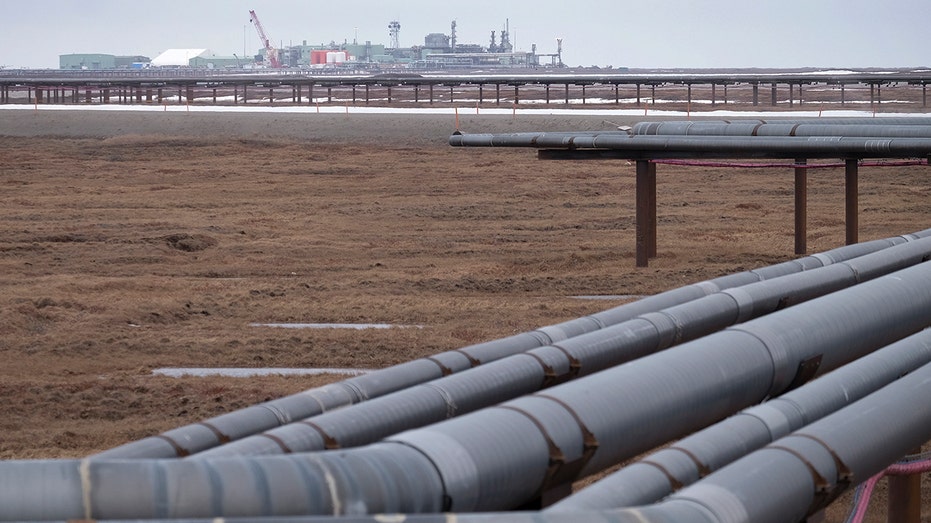Biden admin stifling Alaska oil drilling project would hurt 'indigenous' communities the most, oil exec warns
CEO of Alaska Oil & Gas Association Kara Moriarty detailed economic, energy benefits of the Willow Project
Alaska leaders demand Biden administration 'not kill' oil drilling project
CEO of Alaska Oil & Gas Association Kara Moriarty joined 'Fox & Friends First' of discuss the implications of the canceling the project and why it would hurt the locals most.
A top oil executive reiterated the need for the Biden White House to permit an Alaska oil drilling project, warning indigenous communities will suffer the most if the initiative is thwarted.
President and CEO of Alaska Oil & Gas Association Kara Moriarty discussed how the project benefits the local communities and native Alaskans financially, while also funneling American-made energy into the U.S. energy market.
"I'm a little bit confused of why the president doesn't see a project like this as a major win, because we know we need more oil for the next ten, 20, 30, even 40 years," Moriarty said during "Fox & Friends First" on Thursday. "So if we're not going to produce that oil at home, if we're not going to create that job, those jobs at home, where is that oil going to come from? It's going to come from countries that do not have the same level of environmental standards as we do."
ALASKA READY TO INCREASE OIL, GAS PRODUCTION IF BIDEN ADMIN ALLOWS: GOV. DUNLEAVY
The drilling measure, known as the Willow Project, could produce 180,000 barrels of oil each day, while also unlocking 2,500 jobs for Alaskans. ConocoPhillips Alaska is responsible for spearheading the project.
Despite the financial and energy benefits of the initiative, the effort has been met with some pushback from the Biden administration.

NUIQSUT, AK - MAY 28: Oil pipelines stretch across the landscape outside Nuiqsut, AK where ConocoPhillips operates the Alpine Field on May 28, 2019. (Bonnie Jo Mount/The Washington Post via Getty Images / Getty Images)
Earlier this month, the Bureau of Land Management, which is under the Department of the Interior, suggested a reduction in the original number of drilling sites proposed over environmental concerns.
The department followed up by clarifying the modification does not mean the Biden administration will necessarily proceed with the project.
Moriarty said there is speculation that the agency will reduce the number of drill sites even more, and that decision could be unveiled in early March.
But while some critics of the project suggest the move could have a detrimental impact on the environment, Moriarty pushed back on the climate-rooted opposition, saying it will use "the most modern technology" to counter those concerns.
Alaska gov. on federal drilling: All we're asking for is the go-ahead
Alaska gov. Mike Dunleavy discusses Biden's trip to Saudi Arabia and the impact of the administration's policies on drilling projects.
"It will have reduced greenhouse gas emissions," Moriarty said. "We know that carbon is an issue, and actually, on the North Slope, we have some of the lowest greenhouse emissions in the country because we already re-inject our methane back into the ground. So we pioneer that technology here in Alaska, so it makes perfect sense to approve this project because we need Alaska's oil to supply America's energy."
Alaska Sens. Lisa Murkowski (R) and Dan Sullivan (R) have urged the White House to green-light the measure, citing its monumental economic and energy significance, as lingering questions remain surrounding the project's future.
Moriarty described the oil and gas industry as the "largest private sector employer" when detailing the economic relief that would be afforded to Alaskan indigenous communities if it comes into fruition.
Oil market experiencing the 'chilling effect' of Biden's energy policies: Canary CEO Dan Eberhart
Canary CEO Dan Eberhart discusses the rise in oil and gas prices across the U.S. and the impact of Biden's energy agenda on 'Varney & Co.'
"The number of jobs we create, the contracting jobs, all the jobs created around it, but most importantly, these projects are important to the people of the North Slope of Alaska, the indigenous people, the Inupiat people," Moriarty said.
"The way this works, this is in the National Petroleum Reserve, this project is on federal land - so the revenues are split between the federal government and a large portion goes directly to the local communities of the North Slope borough… So when these type of projects do not get approved, it really hurts the local people the most."
CLICK HERE TO READ MORE ON FOX BUSINESS
Oil prices have soared in recent years amid rampant inflation, with costs surging 1.75% last week after Russia announced it would curtail its March production.























